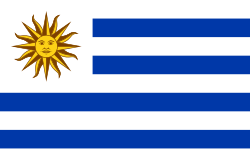This article appears to be slanted towards recent events.(December 2017) |


Smoking in Uruguay in enclosed public spaces became illegal on 1 March 2006. On that date, bars, restaurants or offices where people are caught smoking began facing fines of more than $1,100 or a three-day closure. Uruguay was the first country in Latin America to ban smoking in enclosed public spaces. [1]
Contents
Anti-smoking groups estimate that as many as a third of Uruguay's 3.4 million people smoke. Uruguayan President Tabaré Vázquez, an oncologist, has cited reports suggesting about seven people die each day in Uruguay from smoking-related causes including lung cancer, emphysema and other illnesses. [2]
To help promote the plan, president Vazquez launched a campaign called "A Million Thanks," which is a reference to the number of Uruguayan smokers. So far, the campaign seems to have won these people over, as an opinion poll conducted by the Ministry of Public Health states that close to 70% of the country's smokers support the legislation. [3]
The president was the impetus behind the government-decreed measure, which is among the world’s toughest and is similar to bans already in place in Ireland, Sweden, and Norway. [4]